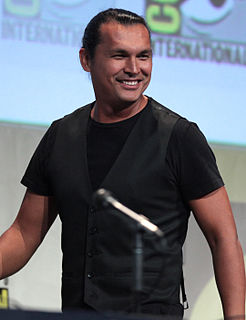A Quote by Polo G
One thing I can say as far as people from black communities dealing with trauma or PTSD is putting some trauma centers or some type of therapy sessions and some after-school programs for the kids, so they can have a real outlet to express themselves.
Related Quotes
If we take a hard look at what poverty is, its nature, it's not pretty - it's full of trauma. And we're able to accept trauma with certain groups, like with soldiers, for instance - we understand that they face trauma and that trauma can be connected to things like depression or acts of violence later on in life.
Even in New York City, we've seen some major improvements from the way the system was 20 years ago. There's still a lot to do - we know that training workers and parents, reducing caseload size, developing therapeutic foster care, strengthening kinship care, and putting more emphasis into preventive care are all solutions. Unfortunately, if a child is in a situation where removal from the home becomes neccessary, there's already been trauma. Putting a traumatized child into a "system," not a home, with strangers is creating a perfect storm for further trauma.
The acting served as an outlet for my emotions for some time because I was doing it under the guise of someone else. And that can only be therapeutic up to a point until you truly deal with it and can express it to someone directly. Acting was a helpful outlet for me as a child. In some ways, I can say it saved my life.
In Chicago, you have an absence of strong family units, and that absence gets filled by gangs. You have a failure in the school system, after-school programs and other social programs to help keep kids off the streets. Amnesty International speaks to that in some way, by keeping these issues in the forefront.
I think trauma gets a reductive treatment. We tend to think only violence or molestation or total abandonment qualify as "childhood trauma," but there are so many ruptures and disturbances in childhood that imprint themselves on us. Attachment begets trauma, in that broader sense, and so if we've ever been dependent on anyone, I think there is an Imago blueprint in us somewhere.
It is true that many creative people fail to make mature personal relationships, and some are extremely isolated. It is also true that, in some instances, trauma, in the shape of early separation or bereavement, has steered the potentially creative person toward developing aspects of his personality which can find fulfillment in comparative isolation. But this does not mean that solitary, creative pursuits are themselves pathological.
We [Americans] have a historical trauma when it comes to the past relationships when it comes to Native Americans and the history of how America was created. With this film, it's nice to see that the trauma is presented from a white male that was in the Civil War and that trauma affects him in a way that still exists.




































